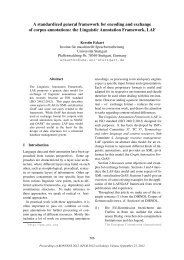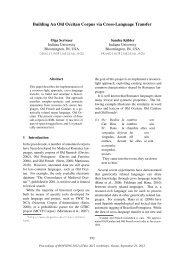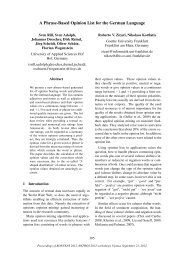- Page 1 and 2:
11 th Conference on Natural Languag
- Page 3 and 4:
Table of Contents Main conference P
- Page 5 and 6:
Comparing variety corpora with vis-
- Page 7 and 8:
LexSem 2012: Workshop on Recent Dev
- Page 9 and 10:
KONVENS 2012 The 11 th Conference o
- Page 11 and 12:
Organizers: Jeremy Jancsary (ÖGAI/
- Page 13 and 14:
Ines Rehbein (Potsdam University) M
- Page 15 and 16:
Integrating viewpoints into newspap
- Page 17 and 18:
Phonetically aided syntactic parsin
- Page 19 and 20:
The Statistical Approach to Natural
- Page 21 and 22:
Data-driven Knowledge Extraction fo
- Page 23 and 24:
4 The Different Relations Types In
- Page 25 and 26:
Relation Type #Patterns Examples Su
- Page 27 and 28:
Suits-to Served-with Substituted-by
- Page 29 and 30:
References Timothy Chklovski and Pa
- Page 31 and 32:
1.2 Problem Definitions In a MRA, t
- Page 33 and 34:
oot person organisation product ...
- Page 35 and 36:
Group Organis. Persons Products all
- Page 37 and 38:
Method α α+β α+γ all SentiWS 0
- Page 39 and 40:
A Supervised POS Tagger for Written
- Page 41 and 42:
Our tagset mixes and matches tags a
- Page 43 and 44:
ecause the enclitic pronoun is an i
- Page 45 and 46:
stochastic rules as opposed to larg
- Page 47 and 48:
Kevin Duh, and Katrin Kirchhoff. 20
- Page 49 and 50:
forms, and that existentials can be
- Page 51 and 52:
Pseudo Verb Punctuation PNC
- Page 53 and 54:
NLP Workflow for On-line Definition
- Page 55 and 56:
nological phrases on the basis of p
- Page 57 and 58:
Figure 2: A screenshot of the entir
- Page 59 and 60:
When analyzing the evaluation sets
- Page 61 and 62:
Projecting Semantic Roles via Tai M
- Page 63 and 64:
quent prediction, return it (iii) i
- Page 65 and 66:
for the B/T/FT settings. This is pr
- Page 67 and 68:
ut it is implied by Table 3 and Fig
- Page 69 and 70:
References Wanxiang Che, Zhenghua L
- Page 71 and 72:
Our ultimate goal is to develop com
- Page 73 and 74:
ADORNING CAUSE_FLUIDIC_MOTION COTHE
- Page 75 and 76:
English nouns, verbs, adjectives, a
- Page 77 and 78:
considerably worse than FrameNet. T
- Page 79 and 80:
Extraction. In Proceedings of the 1
- Page 81 and 82:
lexicon from a document-derived voc
- Page 83 and 84:
Initialize hypernym set H to contai
- Page 85 and 86:
ulary distance. Let d(a, b) denote
- Page 87 and 88:
the reduced lexicon (243) was neare
- Page 89 and 90:
Adding nominal spice to SALSA - fra
- Page 91 and 92:
SALSA verbs nouns 0 FE 0 2 1 FE 68
- Page 93 and 94:
gen, which in one of its meanings i
- Page 95 and 96:
In the next section we describe how
- Page 97 and 98:
Acknowledgments This work was funde
- Page 99 and 100:
most commonly used (Turney and Pant
- Page 101 and 102:
anteed because the forward feature
- Page 103 and 104:
5 000 feat ICA50 SVD50 SENNA Semcat
- Page 105 and 106:
words bicycle and tricycle go with
- Page 107 and 108:
of the Twelfth European Conference
- Page 109 and 110:
incorporate the context information
- Page 111 and 112:
those candidate phrases that are an
- Page 113 and 114:
5.2 Evaluation Metrics for WPD The
- Page 115 and 116:
Runs F-measures α=0.5 α=0.2 Pur.
- Page 117 and 118:
Evaluations (SemEval-2007), June (2
- Page 119 and 120:
2 Related Work The majority of pape
- Page 121 and 122:
and Roth, 2009; Lin and Wu, 2009).
- Page 123 and 124:
Features Dev Test CoNLL-2003 w 0 +
- Page 125 and 126:
Feature Dev Test Test+ — 93.78 91
- Page 127 and 128:
the Joint Conference of the 47th An
- Page 129 and 130:
tion. It was first included as a sp
- Page 131 and 132:
indicates the presence of the ellip
- Page 133 and 134:
[Armada britainiarrak] [Ipar Irland
- Page 135 and 136:
Información, (JOTRI 2003), pages 1
- Page 137 and 138:
Phonetically aided Syntactic Parsin
- Page 139 and 140:
mar network or PCFG. Grammar networ
- Page 141 and 142:
phonetic confusion that has the con
- Page 143 and 144:
in confusion in the network. This i
- Page 145 and 146:
Linguistic analyses of the LAST MIN
- Page 147 and 148:
Table 1: Comparison between corpora
- Page 149 and 150:
Table 2: Most frequent POS patterns
- Page 151 and 152:
Table 3: A problematic dialog situa
- Page 153 and 154:
6 Summary We have presented the cur
- Page 155 and 156:
S-restricted monotone alignments St
- Page 157 and 158:
s k n i i: f phh ohehnh ih xh s k n
- Page 159 and 160:
Dataset µ G µ P P [G>15] P [P >15
- Page 161 and 162:
Perplexity H(L | P ) 2PKE-Uni 7.002
- Page 163 and 164:
(1, 1) (2, 1) (3, 1) (4, 1) (1, 2)
- Page 165 and 166:
Use of linguistic features for impr
- Page 167 and 168:
whereas English has a verb-initial
- Page 169 and 170:
Accuracy of Accuracy of Accuracy of
- Page 171 and 172:
English Persian Train: Sentences 30
- Page 173 and 174:
to compensate for sparsity of paral
- Page 175 and 176:
Name # Documents # Tokens # Lemmas
- Page 177 and 178:
Figure 1: Precision-Recall graphs c
- Page 179 and 180:
A Multi-level Annotation Model for
- Page 181 and 182:
and sentence level with the aim of
- Page 183 and 184:
(Schmid, 1995; Schiller et al., 199
- Page 185 and 186:
EI EII Tag AKR MARK Typography ITER
- Page 187 and 188:
References Saima Aman and Stan Szpa
- Page 189 and 190:
Robust processing of noisy web-coll
- Page 191 and 192:
1. first strip of the papery skin o
- Page 193 and 194:
References Jon Chamberlain, Massimo
- Page 195 and 196:
ments between its LSRs. Additionall
- Page 197 and 198:
Figure 3: In the sense comparison v
- Page 199 and 200:
Using Information Retrieval Technol
- Page 201 and 202:
against every tree. Others avoid th
- Page 203 and 204:
A 0.780715 NN Figure 4: A sp
- Page 205 and 206:
# #Documents Index Size 1 29,704 1.
- Page 207 and 208:
References P. Bański, C. Belica, H
- Page 209 and 210:
(2012), in their corpus study of va
- Page 211 and 212:
DET NSUBJ ADV OBJA AMOD Seine Tante
- Page 213 and 214:
A Computational Semantic Analysis o
- Page 215 and 216:
(6) a. Is Spain very large? b. Is B
- Page 217 and 218:
References Alan C. Bale. 2008. A Un
- Page 219 and 220:
219 Proceedings of KONVENS 2012 (Ma
- Page 221 and 222:
221 Proceedings of KONVENS 2012 (Ma
- Page 223 and 224:
Using subcategorization frames to i
- Page 225 and 226:
5.2 Word clustering based on the Le
- Page 227 and 228:
erage of english grammars. In Proce
- Page 229 and 230:
cases not disambiguated using langu
- Page 231 and 232:
Not surprisingly, the results show
- Page 233 and 234:
Automatic Identification of Languag
- Page 235 and 236:
Differences also appear at the synt
- Page 237 and 238:
Acknowledgments The authors express
- Page 239 and 240:
2 Related Work Previous work on POS
- Page 241 and 242:
The XY tag is used for all non-word
- Page 243 and 244:
Comparing Variety Corpora with Vis-
- Page 245 and 246:
INPUT variety corpus comparability
- Page 247 and 248:
References Andrea Abel and Stefanie
- Page 249 and 250:
Features Context features (token wi
- Page 251 and 252:
0.7 0.7 0.6 0.6 0.5 0.5 F-measure 0
- Page 253 and 254:
ties into fine-grained classes. In
- Page 255 and 256:
verbials (e.g., therefore, still).
- Page 257 and 258:
word raw freq. non conn. conn. (of
- Page 259 and 260:
Corpus-based Acquisition of German
- Page 261 and 262:
Events Objects IPrec CPrec IPrec CP
- Page 263 and 264:
References Marco Baroni, Silvia Ber
- Page 265 and 266:
Preface The present proceedings con
- Page 267 and 268:
Workshop Program Friday, September
- Page 269 and 270:
Unsupervised Sentiment Analysis wit
- Page 271 and 272:
pling (Geman and Geman, 1984) to es
- Page 273 and 274:
References Anders Björkelund, Bern
- Page 275 and 276:
Class # Events in % neutral 45’01
- Page 277 and 278:
3.1.1 Rules Let t 1..n be tokens of
- Page 279 and 280:
Human 6 System 6 Human 4 System 4 A
- Page 281 and 282:
Codebuch Akteursanalyse. rev. 2011.
- Page 283 and 284:
of our work in the whole applicatio
- Page 285 and 286:
3.4 Negation and graduation Valence
- Page 287 and 288:
local context. For instance, in une
- Page 289 and 290:
n’était pas très favorable au G
- Page 291 and 292:
Domain-specific variation of sentim
- Page 293 and 294: query building blocks comments real
- Page 295 and 296: References Monica Bednarek. 2006. E
- Page 297 and 298: 3 Basic Methodology of Annotation T
- Page 299 and 300: (3) A. V případě jeho kandidatur
- Page 301 and 302: 4.3 Auxiliary data - Mall.cz We hav
- Page 303 and 304: Overlap f-score Source 0.750 Polar
- Page 305 and 306: A Phrase-Based Opinion List for the
- Page 307 and 308: the Stuttgart-Tübingen Tagset (STT
- Page 309 and 310: As for noun-based opinion phrases a
- Page 311 and 312: More than half of the words and phr
- Page 313 and 314: treebank. In Proceedings of the Wor
- Page 315 and 316: Apart from these, we distinguish op
- Page 317 and 318: close variants)”. In fact importa
- Page 319 and 320: What is the Meaning of 5 *’s? An
- Page 321 and 322: For each category, we follow (Const
- Page 323 and 324: Positivity Term 2.87692577130 elske
- Page 325 and 326: In recent years, the use of rating
- Page 327 and 328: KONVENS 2012 LThist 2012: First Int
- Page 329 and 330: Organisation Committee: Thierry Dec
- Page 331 and 332: Workshop Program Friday, September
- Page 333 and 334: Rule-Based Normalisation of Histori
- Page 335 and 336: isation rules were applied to the i
- Page 337 and 338: ments in the gold standard have bee
- Page 339 and 340: cation in the contemporary SUC samp
- Page 341 and 342: proach. References Maria Ågren, Ro
- Page 343: 2 Related Work There has been consi
- Page 347 and 348: alects, or even languages. Norma ca
- Page 349 and 350: ization (rather than modernization)
- Page 351 and 352: The Sketch Engine as infrastructure
- Page 353 and 354: 2.1 The Corpus of English Dialogues
- Page 355 and 356: Other notable contrasts are that 17
- Page 357 and 358: Evaluating a Post-editing Approach
- Page 359 and 360: Figure 1: Example of a marriage lic
- Page 361 and 362: all possible concatenations of indi
- Page 363 and 364: Table 3: Post-editing results. Time
- Page 365 and 366: okstaffua, bokstaffwa, bokstafwa, b
- Page 367 and 368: Rule Cost v↔u 0.1 v↔w 0.1 u↔o
- Page 369 and 370: graphic word boundaries and conside
- Page 371 and 372: ation. Gulordava and Baroni (2011),
- Page 373 and 374: ut adding a statistical measure to
- Page 375 and 376: e.g. philosophical and political pr
- Page 377 and 378: of the EACL 2009 Workshop on GEMS:
- Page 379 and 380: Most of the research on genre class
- Page 381 and 382: Precision Recall F 1 Unigrams 0.551
- Page 383 and 384: The DTA ‘base format’: A TEI-Su
- Page 385 and 386: Lib are complementary in the sense
- Page 387 and 388: inline metadata solutions for edito
- Page 389 and 390: ing. The fourth level contains an e
- Page 391 and 392: the work package ‘Resources and T
- Page 393 and 394: is mainly used with parallel corpor
- Page 395 and 396:
Corrections by the editor were omit
- Page 397 and 398:
Accuracy N % All Words 781/1000 78.
- Page 399 and 400:
$$ $$ $$ $$ $$ $$ $$ $$ $$ Figure 4
- Page 401 and 402:
Digitised Historical Text: Does it
- Page 403 and 404:
3 Related Work Previous research on
- Page 405 and 406:
5.1 End-of-line Soft Hyphen Deletio
- Page 407 and 408:
quite difficult to get an idea of h
- Page 409 and 410:
References Ahmad Abdulkader and Mat
- Page 411 and 412:
cision, recall, and F1. Section 4 d
- Page 413 and 414:
not corrected corrected p P R F1 P
- Page 415 and 416:
From Semi-Automatic to Automatic Af
- Page 417 and 418:
Figure 2: ER-Diagramm of the Morphi
- Page 419 and 420:
Figure 4: Morphilizer’s implement
- Page 421 and 422:
Figure 6: Architecture of Morphorm
- Page 423 and 424:
References Harald R. Baayen, R. Pie
- Page 425 and 426:
edition has been adopted. This is d
- Page 427 and 428:
marginalia, emendations or punctuat
- Page 429 and 430:
Word Lemma Class Subclass Type Tens
- Page 431 and 432:
Figure 3. Sample screenshot of comp
- Page 433 and 434:
KONVENS 2012 LexSem 2012: Workshop
- Page 435 and 436:
English) closely and discusses the
- Page 437 and 438:
Workshop Program Friday, September
- Page 439 and 440:
verbs were collected mostly from an
- Page 441 and 442:
3 Theoretical Background Let us now
- Page 443 and 444:
are sensible to semantic properties
- Page 445 and 446:
Cançado, Márcia and Amaral, Luana
- Page 447 and 448:
morphological tagger for Russian la
- Page 449 and 450:
whom/which something is taken. (7cz
- Page 451 and 452:
Verb class same frame different fra
- Page 453 and 454:
Construction Grammar are introduced
- Page 455 and 456:
posed to Hon åker på måndag ‘S
- Page 457 and 458:
nitions of Agent, for example. Inst
- Page 459 and 460:
Framenet++, VR dnr 2010-6013), by t
- Page 461 and 462:
Källström and Inger Lindberg, edi
- Page 463 and 464:
scoring function σ : W ×L×W →
- Page 465 and 466:
esults in the triple 〈heutige Son
- Page 467 and 468:
Unlexicalized links 7,833,635 n (i)
- Page 469 and 470:
The difference in accuracies betwee
- Page 471 and 472:
Towards high-accuracy bilingual phr
- Page 473 and 474:
over a set of candidate translation
- Page 475 and 476:
each soft restriction soft m set on
- Page 477 and 478:
(> 98% in scalable precision) and a
- Page 479 and 480:
References Colin Bannard and Chris
- Page 481 and 482:
Preface The need for automatically
- Page 483 and 484:
15:50-16:15 Coffee break 16:15-16:4
- Page 485 and 486:
Standards for the technical infrast
- Page 487 and 488:
⎡ ⎤ phrase CATEGORY np ⎡ ⎤
- Page 489 and 490:
The representation of the feature v
- Page 491 and 492:
ement, while the interpretation as
- Page 493 and 494:
hand, checking the validity of FSR
- Page 495 and 496:
Standardizing metadata descriptions
- Page 497 and 498:
2 LMF and semantic interoperability
- Page 499 and 500:
can register and create DCs. Users
- Page 501 and 502:
all kinds of lexemes, (see Cruse (1
- Page 503 and 504:
constraints, because many aspects o
- Page 505 and 506:
Menzo Windhouwer. 2012. RELcat: a R
- Page 507 and 508:
the meeting in Rome as a starting p
- Page 509 and 510:
As these documents provide the refe
- Page 511 and 512:
Two multi-layer annotated corpora r
- Page 513 and 514:
As audio data is not directly store
- Page 515 and 516:
Jörg Mayer. 1995. Transcription of
- Page 517 and 518:
Towards standardized lexical semant
- Page 519:
Getting involved into language reso





